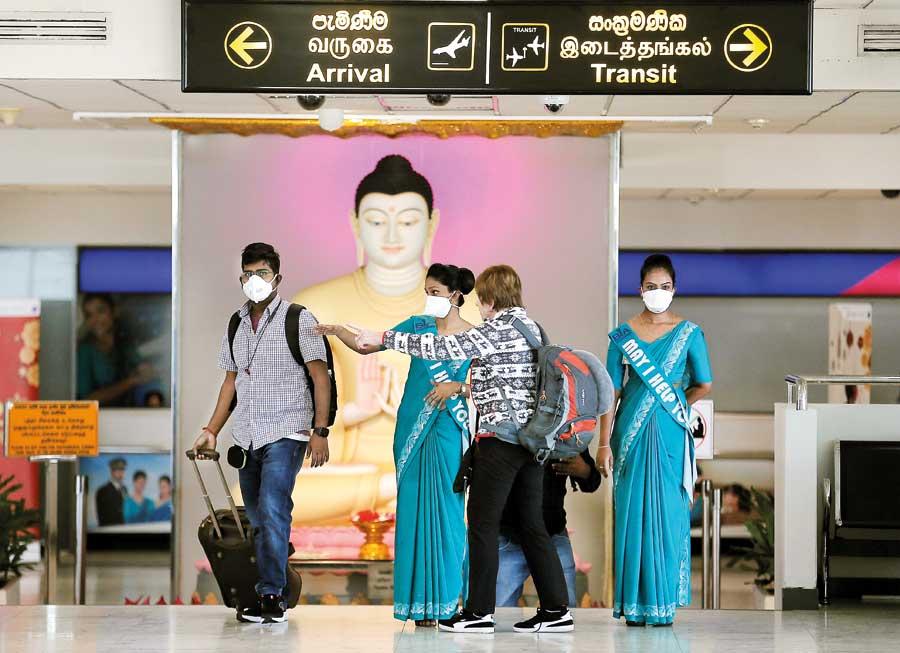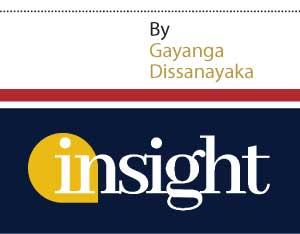Reply To:
Name - Reply Comment

File Photo
As borders reopen, international travel resumes slow and steady. But is the Sri Lankan tourism industry prepared?
- Sri Lanka’s tourism fell by 70.8% from a year earlier to 71,370 in March 2020
- 388,487 direct and indirect tourism and hospitality employees are affected by this crisis
- The government has approved five new airlines to operate into the country before the end of this year in order to boost tourism following the easing of Covid curbs
- There is a definite labour shortage in the industry as many people had left seeking other forms of employment
- With recent crises most have lost their savings, and are now hopeful of a scheme similar to ETF and EPF to benefit their future
- Many in the tourism field believe they are ‘hire and fire’ employees
Tourism has traditionally been the third largest foreign exchange earner in our country. International travel and tourism industry contributes a substantial proportion to Sri Lanka’s Gross Domestic Product and is among the worst hit industries in the country due to the COVID-19 pandemic.
and tourism industry contributes a substantial proportion to Sri Lanka’s Gross Domestic Product and is among the worst hit industries in the country due to the COVID-19 pandemic.
According to the Sri Lanka Tourism Development Authority (SLTDA), Sri Lanka’s tourism fell by 70.8% from a year earlier to 71,370 in March 2020 amid the COVID-19 crisis. Tourist arrivals from January to March 2020 were 507,311 in comparison to 2.3 million in 2018 and 1.9 million in 2019. Passenger flights and ship arrivals for international guests also stopped in March 2020. This was a significant and severe blow to the country’s economy. According to the SLTDA, there are 388, 487 direct and indirect tourism and hospitality employees who are affected by this crisis. And now the industry is finally starting to rebound. But will the industry be the same again, we asked some stakeholders of this battered industry.
A request for duty free vehicles suitable for tourism
Chauffeur Tourist Guide Lecturers’ Association (CTGLA) president, Hirantha Perera, said that many people have left their jobs, taken up other careers, sold their cars and even gone abroad. There is definitely a labour shortage and the industry has lost quite a lot of people. They are currently in discussions and planning on how to revive this and get favourable compromises for their employees so that they would not be in dire situations when such a crisis occurs again.
Perera continued saying that their request from the government is to give the remaining employees duty free vehicles suitable for tourism to continue their work. Those who have vehicles were given a moratorium for the loans obtained, but some companies charge a huge interest for them. “We are asking not to charge such heavy interest. We request them to transfer the accounts from those private institutes to government banks and charge them with more manageable and concessional interest rates.”
From Perera’s perspective, everyone is doing their best to recover the tourism industry. He said that the SLTDA specifically is working intensively and hand in hand with them to make the best possible decisions for the industry and the people working there. But he said that they would like to see the active involvement of other organizations connected to the tourism industry too. Sometimes it’s difficult to get positive feedback or replies for their requests and recommendations and this is a setback for them. At the moment they are constantly trying to connect with the Sri Lanka Association of Inbound Tour Operators (SLAITO) and come to favourable agreements and discussions with them. “It’s rather challenging but we are hopeful,” he said.
No EPF or ETF for those in the tourism industry
According to Perera, another issue is that they lack either EPF (Employees’ Provident Funds) or ETF (Employees’ Trust Funds). After retirement, their only means of living is the savings that they had collected from their daily tours. And from all the crises of recent times, they have lost almost all their savings and it’s a struggle for employees who are holding on to this industry. If they could get those funds, it would be an immense support for those in the tourism field.
Since November 1, 2021, some travel limits, including train services between provinces have been lifted as the authorities focus on reducing the death rate from COVID-19 to zero. With the re-opening of the country to travellers, the Sri Lankan government has approved five new airlines to operate into the country before the end of this year in order to boost tourism following the easing of Covid curbs. The president also ordered the tourism staff to be given a third Covid vaccine jab as part of a bid to reopen the travel industry and revive the economy.
Tourism Minister Prasanna Ranatunga also said there was strong interest from travellers from countries such as Russia, Britain, France and Germany, and that international flights will be increased in the near future.
"We are a small country and we aren’t following proper regulations when it comes to the tourism industry which is an integral part of our country’s economy. If this changes, I’m positive that we can do much better when it comes to facing crisis situations"
The need for better regulation in the industry
Mr. Heshan Wikramathilake, tour guide and restaurateur in Kandy told the Daily Mirror that the tourism industry in Sri Lanka needs more proper and fair regulation. Many people have lost hope in this field and will not be returning to the industry. He pointed out that the national tour guides should have a strict salary and proper educational programmes and further examinations to update their knowledge and qualifications. Employees in the tourism industry bring a lot of income to the country but still the tour guides only receive around Rs. 20,000 and are identified as “unofficial ambassadors.” He explained that some people join the industry just for the sake of money and leave the industry carelessly once it faces challenges, and those who have passionately dedicated themselves to these careers have to suffer the consequences. When asked about the practicality of placing heavy investments in a volatile industry such as tourism, he answered saying that investment in anything is always a risk. The person who is willing to invest in it should have an idea of what they’re getting into and take that risk in order to see success in it. “We are a small country and we aren’t following proper regulations when it comes to the tourism industry which is an integral part of our country’s economy. If this changes, I’m positive that we can do much better when it comes to facing crisis situations.”
The SLTDA, with the support from the Market Development Facility (MDF) also launched a membership drive to encourage informal sector tourism operators to register with the SLTDA.
According to The World Tourism Organization predictions, international tourism itself might fall back to the 2012-2014 period and domestic tourism will be increased. Growing demand for travel insurance, more foreign independent travel than group inclusive tours, rising demand to island destinations and increased demand for direct flights than connecting flights will likely be seen.
More involvement from the government is necessary
Mr. Priyalal Neranjan Malaviarachchi, treasurer at the Sri Lanka Institute of National Tourist Guide Lecturers (SLINTGL) mentioned that they cannot assure complete recovery for the industry right away because of the pandemic’s nature. The tourism industry needs more support and involvement from the government. If this goes downhill every time a crisis occurs, then it’s clear that there should be more regulation and planning on how to face them. He explained that the problem with our country is that we are both economically and politically unstable. The programmes and promotions the government has done for them have been helpful but they need more support and infrastructure facilities from them.
“With the Easter bomb attacks and the pandemic, the focus our government gave to the people in the tourism industry was very little. Tour guides were given a one off salary of Rs. 20,000 and the drivers Rs.15,000 and that was the only action they took. They could have done better to keep these people in the industry. They could have at least given a soft loan for them to recover a little,” Malaviarachchi said. “The SLTDA is trying their best but most of their efforts are unsuccessful because of the lack of support from the government. If our requests and recommendations aren’t given a chance, the amount of people contributing to the industry might definitely decrease.”
We are the “hire and fire” employees
Malaviarachchi continued by saying that there’s no point of talking about inclusive growth in the industry without focusing on human resources. “They know the sensitivity of this industry and are still not taking any action to strengthen it. If this continues, these challenges and problems will be the same in the face of future crises too.” At the moment they are requesting a salary of at least 35 dollars a day and even though the SLTDA wants to grant those, there are other parties who challenge them and go against these requests.
He pointed out that they are the “hire and fire” kind of employees. “After they have taken our service, they don’t have anything to do with us. We don’t have insurance or social securities” he said. “Normally a tour guide works around 150 days a year and what they earn from those days is their only income. We can’t just dismiss a large industry of our country like tourism. A tourism minister is appointed because this industry is important and they should be making effective plans for us to survive these crisis situations and make sure this downfall isn’t happening again and again.”
Changes in the tourism industry are expected. However, re-opening the country for travelling should be carried out with extreme caution. Authorities will have to introduce and follow new guidelines in running all the work related to tourism and travel, making sure that the health risks are duly minimized without affecting the satisfaction and experience of the travellers. It should not disrupt the pandemic control measures implemented by the health sector as it would lead to widespread outbreaks or the introduction of new strains in the country. Such incidents will cause devastating effects that would be overwhelming for the health system capacity.
The tourism industry in Sri Lanka is a vital pillar on which our economy stands. It creates heaps of employment opportunities, develops our infrastructure, forms strong cultural bonds and cross-culture awareness, preserves the environment, and many more. Therefore the country should take the necessary steps to protect and maintain this industry even during this crisis and ensure that it would not face its downfall. We should do our best to uphold Sri Lanka’s position as a major tourist destination alongside the required and effective regulations for the continuation of this industry’s success.